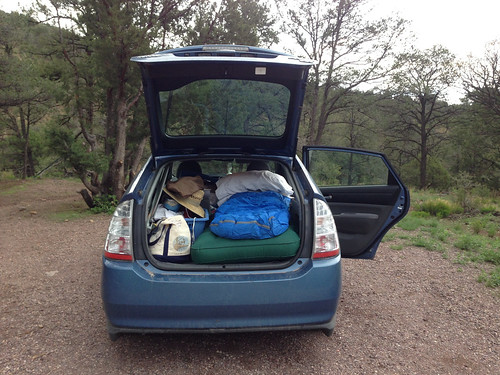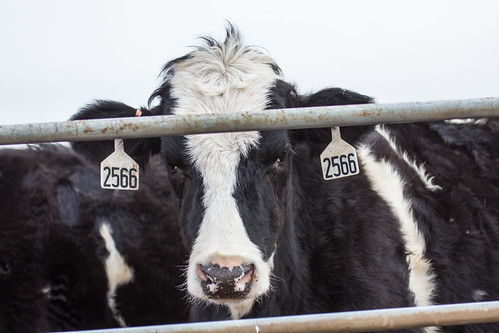When Russ and I moved to Duluth in 1981, we both yearned to
live in the beautiful north woods, but made the decision to purchase an older house within
walking distance of his workplace and the neighborhood elementary and high
schools specifically so we’d not be squandering fossil fuels in our day-to-day
lives or contributing to habitat fragmentation. In wilderness is the
preservation of the world, but I've always believed that in cities is the preservation of wilderness. My daughter in Brooklyn doesn't need a car at all--she gets everywhere she needs to get in her daily life on bicycle, walking, or using public transportation. When Russ and I lived in Madison, Wisconsin, we rented a parking space a few blocks away and often didn't drive for weeks at a time. Duluth isn't as convenient as New York or Madison for public transportation, but we try to be mindful before we make a trip in the car anywhere. We drive at the slowest speed that is safe, courteous, and convenient to keep our gas consumption as low as it can possibly be when we do use the car.
Russ
has worked tirelessly over the years to make our house as energy efficient as
possible. The first thing he did when we moved in was to research and buy the most efficient furnace we could afford, and
then he quickly started re-insulating the entire house, room by room. We’ve kept
our thermostat down well below what most people consider comfortable since we
moved here, not turning it to the upper 60s downstairs until his mom moved in
with us—she’s 97, so we have to keep it a bit warmer than we like down there,
but keep our upstairs much cooler. Russ replaced our incandescent light bulbs
long ago, as soon as alternatives were available. We installed an on-demand
water heater rather than keeping a water tank heated in the Duluth cold. I
drink a cup of coffee every morning, heating the water in a kettle that warms
it to exactly 208 degrees and shuts off. I measure the water before heating it,
so I’m not wasting electricity heating up more than I need. The keyboard I
use at my computer is solar powered, and I got the most energy efficient laptop I
could find, which I run on the energy savings mode. We have always tried to buy
as few products as possible from overseas, especially China, knowing how on top
of all the other economic, environmental, and human rights issues involved,
highly polluting bunker fuel is what powers the container ships that bring all
that stuff here.
Russ and I were freshmen in college during the first Earth
Day, and have tried from the start to be conscientious about our energy
consumption, but as I researched my book 101
Ways to Help Birds, I became even more alarmed at the issues, and learned
lots of little tricks for conserving even more energy in our day-to-day lives.
Russ takes enormous pride in watching our energy bills go down year after year,
even when fuel and electricity prices are going up, because we have tried so
very hard to save energy.
In recent years, I’ve had many wonderful opportunities to
travel to new places. I have so relished this—I grew up in a blue-collar home
where no one traveled, and can see first hand how limited experiences of the
world limit people’s understanding and outlook when it comes to larger issues.
In my own case, it was seeing firsthand during my Conservation Big Year the
habitat destruction and some of the huge energy costs involved in cattle
production that led me to entirely stop eating beef—now some people are
suggesting that giving up beef reduces our carbon footprint even more than
giving up our cars. In my book, I recommended purchasing grass-fed rather than
corn-fed beef because pastureland can provide multiple values for wildlife
compared to cornfields. But it turns out grass-fed cattle produce far more
methane gas, contributing significantly more to climate change. That was the
saddest awakening when I was researching my book in the first place—even things
that seem innocuous may turn out to exact a larger environmental cost than we realize.
Even though travel provides both pleasure and education,
with our growing awareness directly leading to positive environmental changes, all travel comes at a huge energy cost. When I fly, I usually take the shuttle from
Duluth to the Minneapolis airport to conserve energy for that leg of the trip.
I took the train to Chicago when I wanted to hear Joel Greenberg talk about his
Passenger Pigeon book. When my daughter lived in DC and I was in Ithaca, she took a bus to Ithaca and we drove home together for the holidays, to reduce
our energy usage. When I do fly or take a long drive (after all, driving alone even
in a Prius uses more fuel per passenger mile than flying) I try to purchase
carbon offsets, sometimes through an airline, and sometimes through
contributions to organizations that plant forested or
prairie habitat.
In other words, I do my best to conserve energy and water
wherever I happen to be. I try hard to be mindful, and to do my best.
Really, that’s all any of us can do.
A few days ago, I received an email from Dr. Jeff Price, who
is with the Tyndall Climate Change Centre in the UK and used to be with the
American Bird Conservancy. Jeff had some very practical and helpful thoughts
about ways we can reduce the impact of our travel on climate. He writes:
As one of the researchers at
Tyndall Climate Change Centre we are of course concerned about travel and
emissions. Internally, we have a travel tracker that we are all supposed
to use to help us decide if a given trip is ‘necessary’ or not. Even
within the Centre we have a broad spectrum of people and attitudes - from Kevin
Anderson who … took the train from the UK to China for one meeting! even though
it took weeks total travel time round-trip to people like myself who use
offsets and considers the costs and benefits of a trip. So, there is a
range of views.
Jeff suggests some ways of mitigating the damage done
by our travel.
1) Travel – Almost all
airlines offer offsets at the time you purchase a ticket. Depending on the
length of the flight these are about $5 and are run through an independently
audited account to make sure they are doing what they are supposed to do.
These are much better than the offsetting projects of the past and generally do
what they set out to do. The problem is that you may not know, or approve
of, what the offsets are used for (Delta has used it to purchase forest land in
Chile but others might use it on energy efficiency). In that case, a
little extra work can make sure that the offsets really are ‘For the
Birds’. Some of the bird tour companies have their own offsetting and
they tell you exactly what is being done with the money – often preserving an
amount of land in the tropics or reforestation projects in the tropics.
The World Land Trust has a carbon calculator on their website for flights and
you can purchase their offsets through them and know the types of projects it
is benefitting.
2) The rest of your
life. … I do not know the situation where you are but in many parts of
the US and UK you can make the choice to purchase 100% renewable energy.
Alternatively, the World Land Trust has carbon calculators for many other
aspects of day-to-day activities that individuals can choose to offset.
Jeff adds:
I have no affiliation with World
Land Trust, and it is possible other NGOs do something similar, so this is
something positive you can do (and potentially could be the topic of a future
podcast).
Jeff’s suggestions are excellent ones—he even inspired me to
make a donation of a hundred pounds to the World Land Trust.
Coming up with positive actions that people can do to
protect this world we all share is important, and is ever so much more inspiring
and constructive than criticizing and shaming others. Each of us is different in our personal needs, in order to
make our life meaningful and valuable. And each of us is different in our approaches to making a positive
impact, and what we need to do to recharge our batteries to keep making a positive impact. Lang Elliott, who makes most of the natural sounds recordings I use to produce this program, wrote:
Even if our earth ship is sinking (due to climate change, rampant development, etc.), it remains imperative that we retain our ability to touch the miracle, and to smile, laugh, embrace, and love without judgement. Otherwise, we will not be able to live happily and react to life’s challenges with sanity and forethought.Delta Airline's Carbon Offset Program
United Airline's Carbon Offset Program
 |

